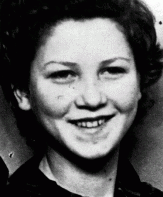
Judith Beker
Born: February 7, 1929
Jonava, Lithuania
Judith was one of three children born to a Yiddish-speaking Jewish family living on a farm near the Lithuanian town of Jonava. Judith's mother had an extensive Jewish education and taught her daughters at home. Her son, Abe, attended a Jewish religious school in Jonava. Judith's father worked in the logging industry.
1933-39: In the fall of 1938, six months after her father died, Judith and her mother moved to Kovno, the capital of Lithuania. She was 9 years old. Kovno at that time had a large Jewish community--approximately one third of the capital's total population. Her mother worked as a seamstress, and they moved to Kovno so that she could find work and so that they could be closer to Judith's older brother and sister who were already working there.
1940-45: The Soviet Union occupied Lithuania in 1940; Germany invaded a year later. In 1943, when Judith was 14, her family was deported to the Stutthof concentration camp. On arrival they were forced to stand at attention; a heavyset female guard walked by with a whip, saying, "No one leaves alive. You're all doomed." Then we were taken to be examined. A woman in line in front of Judith had some teeth ripped out and blood flowed from her mouth. When Judith's turn came a guard put her hand inside her crotch, searching for hidden valuables.
Judith and her sister escaped during a forced march out of Stutthof in the winter of 1944. Later, posing as Christians, they escaped to Denmark where they were liberated in 1945.

